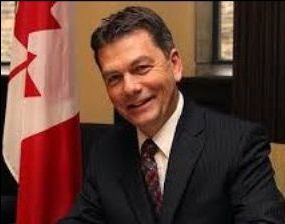Petition supporting Bill C-418 to protect conscience rights (Link).
 |
| David Anderson MP |
Conscience forms the basis of a medical professional’s motivation to pursue their particular field. Doctors practice every day with the knowledge that it is their conscience that motivates them to test the limits of their expertise and skill. They know that patient care will suffer if they are deprived of the ability to live with integrity and follow their conscience. They know the importance of these beliefs to themselves and their patients far better than anyone else.
Freedom of conscience bill to be debated in Canada (Link).For a great many Canadian doctors, the core of their conscience prohibits their participation in taking a life. Indeed, many doctors remain devoted to the black and white of the ancient Hippocratic Oath - a pledge which prohibits the administration of a poison to anyone.
In Canada, the reality is that the provision of a life-ending ‘poison’ is now permitted by the law of the land. Three years ago, taking a patient’s life through medical means was culpable homicide. Doctors were not obligated by any means to provide these services to patients. In 2016, these once unwavering rights were radically challenged through the Liberal government’s legalization of physician-assisted suicide, or medical assistance in dying (MAiD), through bill C-14. The Liberals’ attempt to provide protection for doctors consisted solely of a rudimentary clause which stated that “nothing...compels an individual to provide or assist in providing medical assistance in dying.” However, this provision lacked the teeth needed for its effective enforcement, as evidenced by the ongoing pressure exerted on physicians by their regulating bodies.
It should be noted that even the premise of C-14 – the Supreme Court of Canada’s Carter v. Canada decision – explicitly said that the legalization of euthanasia did not entail a duty of physicians to provide it. Despite this assurance, assisted suicide/euthanasia now exists in this country and, while the law now permits it, many doctors’ consciences will not.
Through the availability of assisted suicide on-demand across Canada, threats to conscience are no longer confined to the rhetoric of the court room – they are increasingly present in the examination room.
That is why I believe it is time to take action in defence of conscience rights that have stood the test of time for generations. My Private Member’s Bill, C-418, seeks to amend the Criminal Code to make it an offence to intimidate a medical practitioner, nurse practitioner, pharmacist or any other health care professional for the purpose of compelling them to take part, directly or indirectly, in the provision of physician-assisted suicide.
C-418 would also make it an offence to dismiss from employment or to refuse to employ a medical practitioner, nurse practitioner, pharmacist or any other health care professional for the reason only that they refuse to take part, directly or indirectly, in the provision of physician-assisted suicide.
My bill would provide the teeth that C-14 acutely lacks.
Are these protections necessary? You bet. Throughout the legislative process, I have spoken with doctors who feel overt pressure to leave family medicine because of their conscientious beliefs. I have heard of palliative care doctors in Ontario who have stopped practicing all together. Nurses feel increasingly bullied, choosing to shift their focus or retire early. The pressure on these professionals exists, and they are looking for relief.
What is more, regional associations, such Ontario’s College of Physicians and Surgeons, have introduced regulations compelling conscientiously-objecting physicians to participate by providing ‘effective referrals’ for physician-assisted suicide. A recent court decision has upheld this directive, contravening the assurances provided in Carter v. Canada and creating an even more urgent need among physicians for protection.
My bill does not address the social acceptability of euthanasia and assisted suicide. Protecting physicians’ conscience rights is not at all a physician vs. patient scenario. By protecting physicians’ conscience rights and relying on them as the experts, patients’ rights are enhanced. C-418 is about protecting the fundamental freedom of conscience and religion guaranteed to all Canadians in the Charter of Rights and Freedoms.
Parliamentarians from all parties cannot ignore the groundswell of support my bill, C-418, has received from across Canada. Canadians believe it is time to stand up for doctors and health care providers who aren’t willing to leave their core ethics behind when they’re at a patient’s bedside.
David Anderson, MP

3 comments:
Thank You for taking the time and effort to create Bill C 418. I signed the petition yesterday, sent to my MP Maryam Monsef. R Vandenberg
Would this Bill include the conscience rights surrounding the abortion pill?
That would be good to include.
This bill only concerns the issues of euthanasia and assisted suicide. Bill C-418 amends the euthanasia law and by doing so it only concerns euthanasia or as others say Medical Aid in Dying. Conscience rights are generally a provincial health care matter, but because the federal government included the issue of conscience rights in the bill that legalized euthanasia that enabled Mr. Anderson to amend that legislation.
Post a Comment